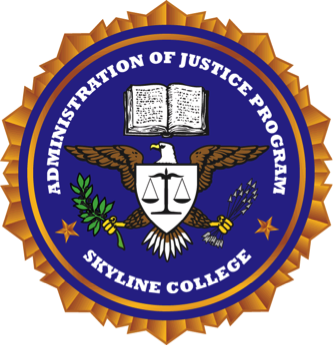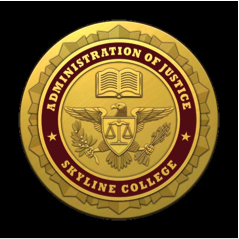Administration of Justice
ApplyOur Program
The Administration of Justice Program at Skyline College provides a solid educational foundation in criminal justice studies, allowing students an opportunity to explore the varied aspects of the criminal justice field and prepare for a career. The program also allows those already working in the field to fulfill educational goals and career aspirations.

The Field
The administration of justice is a crucial part of our democracy designed to prevent and control crime, shield the public from harm, provide detention and rehabilitation services, and finally, ensure equal justice for all citizens through the judicial system.
In order to succeed in the Criminal Justice field, students should demonstrate strong interpersonal, communication, and critical thinking skills. Problem solving, ambition, organization and a strong desire to serve one’s community are also key qualities needed when working in the justice system.
Skyline College offers a Certificate of Achievement which provides a head start on the road to employment and one Associate of Arts Degree and two Associate of Science Degrees for a clear path to transfer to a four-year institution.
Career Outlook
The administration of justice offers excellent employment opportunities at the local, state and federal levels of criminal justice in a broad range of careers including law enforcement, corrections, courts, social services, probation, forensics, investigation, security, and law.
Wages and demand for jobs varies greatly for these careers across the state and nation. Police Officers in California make an average of $102,920 per year according to the U.S. Department of Labor, and Probation Officers and Correctional Treatment Specialists make an average of $94,650.
Looking for a list of classes offered this semester?
Check out the current class schedule.All Courses
ADMJ 100 Introduction to Criminal Justice (3 units)
Introduction to the history and philosophy of criminal justice including law enforcement, the courts, and corrections. The responsibilities of criminal justice agents, legal frameworks, and the role of the justice system in a pluralistic society. Exploration of the concepts of crime causation, punishments and rehabilitation, and training standards of criminal justice personnel.
ADMJ 102 Principles and Procedures of Justice (3 units)
The role and responsibilities of each segment within the administration of justice system: law enforcement, judicial, and corrections. Procedures in each sub-system and how they relate to one another. May include field research.
ADMJ 104 Concepts of Criminal Law (3 units)
Historical development and philosophy of criminal law and constitutional provisions. Special emphasis on legal definitions, the classifications of crime and their application to the administration of justice system. Study of case law, methodology, and concepts of law as a social force. Also listed as LEGL 304.
ADMJ 106 Legal Aspects of Evidence (3 units)
Origin, development, philosophy and constitutional basis of evidence; constitutional and procedural considerations affecting arrest, search and seizure; kinds and degrees of evidence and rules governing admissibility; judicial decisions and interpreting individual rights and case studies. Also listed as LEGL 306.
ADMJ 108 Community Relations (3 units)
Study of the complex and dynamic relationship between the criminal justice system and the widely diverse multicultural society it serves in addressing crime and conflict. Emphasis will be on the roles and interaction of administration of justice practitioners and their agencies in the community, the challenges and prospects of administering justice within a diverse multicultural population, crime prevention, restorative justice, conflict resolution, and professional ethics in justice administration.
ADMJ 120 Criminal Investigation (3 units)
An Administration of Justice exploration of the concepts and techniques used in the investigation of crime, including crime scene protection, searching for and processing evidence, conducting interviews and interrogations, surveillance, the scientific analysis of evidence, and the preparation of investigative reports.
ADMJ 123 Police Field Operations (3 units)
Exploration of the theories, philosophies, and concepts related to the role expectations and activities of the police officer, including patrol techniques, traffic enforcement, crime prevention, public service responsibilities, and surviving work-related hazards.
ADMJ 125 Juvenile Procedures (3 units)
The study of the extent, causation, and prevention of juvenile delinquency. Includes an analysis of juvenile courts, institutional treatment, probation, parole, and juvenile delinquency prevention programs. The sociological and anthropological approaches to juvenile delinquency will be discussed in terms of their relationship to the administration of justice systems.
ADMJ 128 Juvenile Crime Prevention Strategies (3 units)
Innovative exploration of juvenile justice and issues facing at-risk youth: criminal law, the consequences of crime, and crime avoidance strategies. Course includes field trips and service learning opportunities.
ADMJ 665 Selected Topics in Administration of Justice (0.5- 2 units)
Advanced specialized study in Administration of Justice. This program is designed to offer unique or specialized criminal justice topics of contemporary student interest. Students will learn from and work closely with criminal justice practitioners and bring this newly acquired knowledge back into the community. Topics vary. May be repeated for credit as topics vary.
| Program | Type | Total Units |
|---|---|---|
| Administration of Justice | AS | 60 Units |
| Administration of Justice for Transfer | AS-T | 60 Units |
| Administration of Justice | CA | 24 Units |
The Administration of Justice Program is a department in the Skyline College Social Science/Creative Arts Division. The following statement outlines the mission, goals, and student learning outcomes concerning the Administration of Justice Program.
Mission Statement
The mission of the Administration of Justice Associate of Arts Degree Program is to provide students with a multi-disciplinary course of study of the highest standards that emphasizes critical thinking, the ability to effectively communicate in written and oral form, a substantive and practical knowledge basis in the area of justice administration, and a commitment to lifelong learning that will enable them to think critically about the problems and issues of crime and justice, both as citizens and as professional workers in the criminal justice field.
Program Goals
- Provide excellent instruction by experienced and highly qualified staff using a quality curriculum for undergraduate students in the field of criminal justice that will equip them with the necessary skills to successfully transition from school to work and/or further educational or personal enrichment pursuits.
- Provide a broad selection of contemporary criminal justice courses that will enable students to learn the fundamental and advanced concepts of a variety of learning domains within the discipline of criminal justice.
- Encourage and support faculty research, collaboration, faculty-student interactions, and other professional activities that enhance faculty skills and expertise, as well as student learning and development.
- Provide a range of service activities within the college and in the larger community to apply academic knowledge to practical problems concerning crime and criminal justice, build a strong partnership between the college and the surrounding community, and to contribute to efforts by the college and the larger community to improve the quality of life for all concerned.
Upon completion of the program, students will be able to:
- Identify and describe the structure and functions of the main components of the criminal justice system: law enforcement, courts, corrections, and juvenile justice.
- Recognize the importance of, and practice of, ethical behavior in a professional criminal justice work setting, both within the agency and within the community.
- Exhibit strong and effective written and oral communication skills.
- Critically consider, analyze, and research special issues in criminology and criminal justice and their effects on society.
There are no classes offered during this semester.
Criminal Justice Internship
Internships are experienced-based learning opportunities that can be a critical stepping stone to reaching your professional career goals in the Criminal Justice field!
Nowhere else are internship opportunities so vital than in criminal justice. It is one of the best ways to gain on-the-job experience that you can relate to your criminal justice classroom-based learning experience, and for developing those all-important contacts that may be the very key to your success in the career world.
As you make that transition from classroom to career, especially in today’s tight job market, internships can give you that competitive “edge” that can help you land a permanent position. Furthermore, internships look great on a resume, too.
Since you have worked so hard on your formal education here at Skyline College, it would be wise to consider interning at a criminal justice agency. One way to find out if criminal justice and your career aspirations are a “match” is to “try it on for size.” An internship experience can help you decide!
The Administration of Justice Program and Cooperative Education Program here at Skyline College have partnered to bring criminal justice internship opportunities to our students. Internship applicants must be Administration of Justice students, and must meet personal history and educational requirements to qualify.
To learn more about Criminal Justice Internship:
Contact the Administration of Justice Program Coordinator at 650-738-4134 or in (Room 1-1317), or the Cooperative Education Coordinator (Room 1-1209) in Building 1 for more information!
Certain restrictions and requirements apply to enroll in this course. See Course Catalog for details.
ADMJ Club
Welcome
All students are welcome. You need not be an Administration of Justice student to become a member of the AJ Club. Meetings are generally held on Fridays at 12:30 in classroom 1309 on third floor of Building One.
Purpose of the Club
The Administration of Justice Club has been organized to promote academic success among students who are pursuing studies in criminal justice; to provide a network for students interested in the field of criminal justice; to offer students a wide variety of programs and activities related to criminal justice; and to foster positive public relations between community agencies and Skyline College students interested in the field of criminal justice.

Mission Statement
The Administration of Justice Club works to recognize and promote scholarship among students engaged in preparation for professions in the criminal justice system, as well as those who simply have an interest in the field, and to provide a forum for keeping abreast of new developments in criminal justice. The club also provides opportunities to network and volunteer with the community.
Vision of the Club
We, the members of the Administration of Justice Club, envision ourselves as a cohesive group of individuals working together for the broad common goal of making a difference on our College campus, in our community, and in the world by promoting awareness in a variety of social areas relating to the Administration of Justice and to better prepare ourselves for careers in the criminal justice field.
Club Activities
Our club and its members practice good citizenship both on and off campus. We are involved in community-benefitting activities, such as food bank, toy drives, and fund raisers, as well as activities that help club members become better acquainted with the field of justice administration, such as tours of justice facilities, guest speakers from the justice field, and similar events.
Membership
Dues are $10 for the year. We would very much like you to join us. Contact the AJ Club Advisor (AJ Program Coordinator) at 650-738-4134 or come by the AJ Program Office in 1-1317 for more information.
Gold Medal Award
The Administration of Justice Program offers the Gold Medal Award to ADMJ students who meet or exceed the following criteria and have submitted the completed application form and supporting documentation to the Administration of Justice Program Coordinator no later than thirty (30) days prior to graduation.
To qualify, the ADMJ student must:
1. complete all 27 units of the Administration of Justice Certificate Program and . . .
- have a GPA of 3.3 in Administration of Justice classes and have completed 30 hours or more of approved community service; or
- have a GPA of 3.5 in Administration of Justice classes and have completed 15 hours or more of approved community service.
2. submit a completed ADMJ Gold Medal Application form, accompanied by documentation supporting completion of courses taken (i.e. transcripts) and documentation supporting performance of approved community service.
What is Approved Community Service?
Note: “Community Service” is completely volunteer service that benefits the greater community at large, not an individual, and which in no way directly benefits the student, including pay or other forms of compensation, or prospective employment consideration by the service recipient.
PAL Scholarship
Founded in 2007 – Authored by Prof. Steve Aurilio, (DCPD Sgt. - Ret.)
The Daly City Police Athletic League (PAL), in conjunction with the Daly City Police Department, has developed a program to help promote post-secondary educational opportunities for Daly City area PAL youth. It is the Daly City Police Athletic League Educational Foundation (or “PAL-Ed”).
The purpose of PAL-Ed is to provide financial assistance to Daly City area PAL high school seniors and community college students who are interested in pursuing a career in the field of law enforcement or criminal justice, and upon graduation from high school will be pursuing criminal justice studies at Skyline College, or will be attending a California P.O.S.T. police academy.
A special PAL-Ed fund will be used to help one student per year pay for course enrollment, registration, tuition, textbooks, supplies, and other academic needs. Daly City PAL will award up to $2,000.00 each year.
Required:
- Serious interest in pursuing Law Enforcement/Criminal Justice career.
- Is, or will soon be, enrolled in the Skyline College ADMJ Program, or
- Is, or will soon be, enrolled in a California P.O.S.T. Police Academy.
- Possess 2.0 GPA (“C” grade point average or better) in current school.
- Possess personal history background consistent with a L.E./C.J. career.
- No felony convictions/dispositions, either as an adult or as a juvenile.
- Have verifiable experience in voluntary community service activities.
- Undergo an application and selection process, including oral interview.
Interested and qualifying candidates must print out and complete the PAL-Ed Application form.
Preferred:
- Be a current resident of Daly City, Colma, or Broadmoor.
- Have participated in Daly City PAL or DC Park & Rec. Dep’t sports.
Mail or deliver the completed application to Professor Steve Aurilio at Skyline College, 3300 College Drive, San Bruno, CA 94066.
Candidates will be notified of application acceptance and will be scheduled for an oral interview with PAL board.


